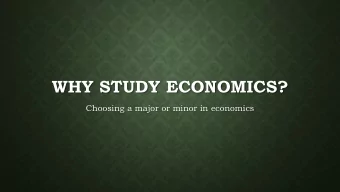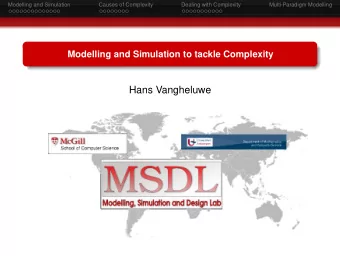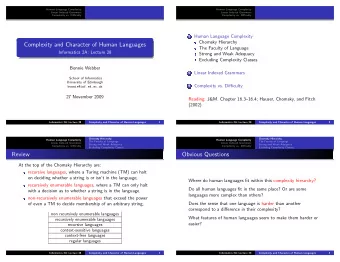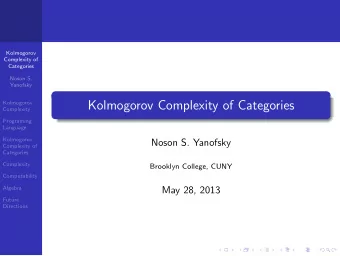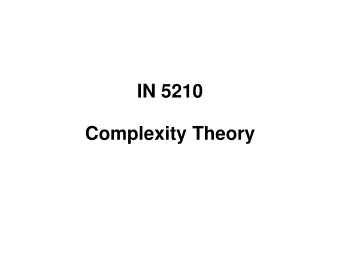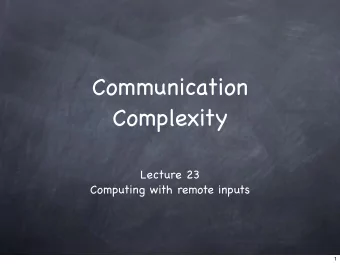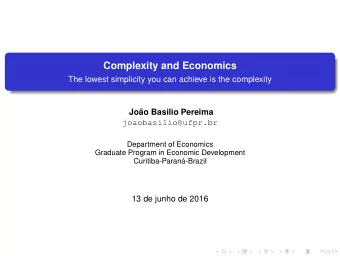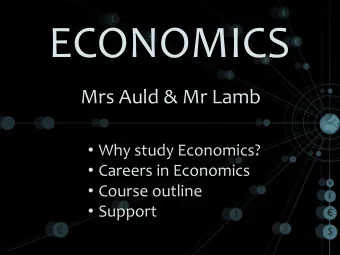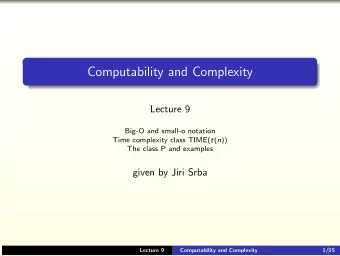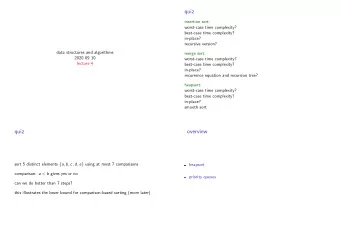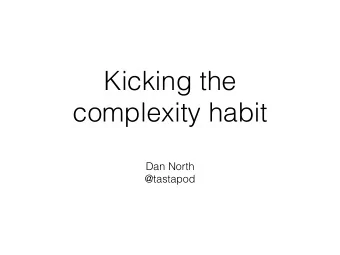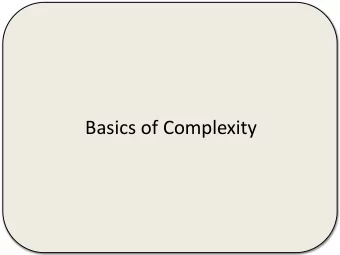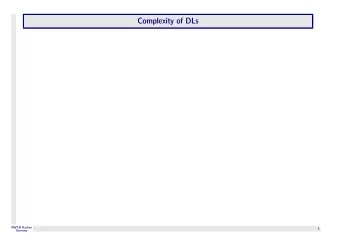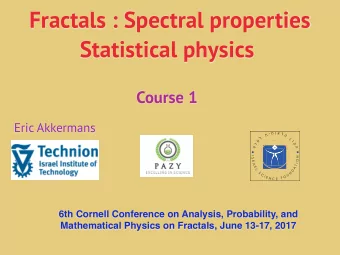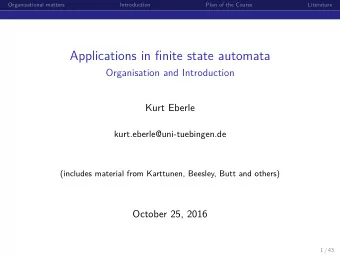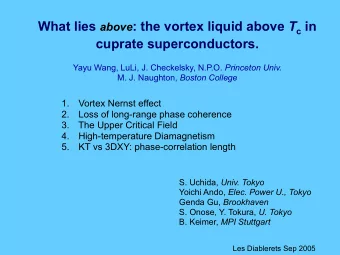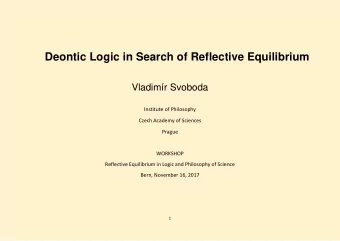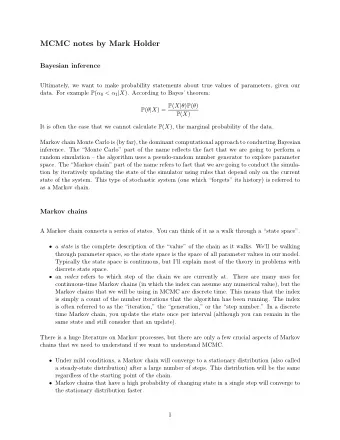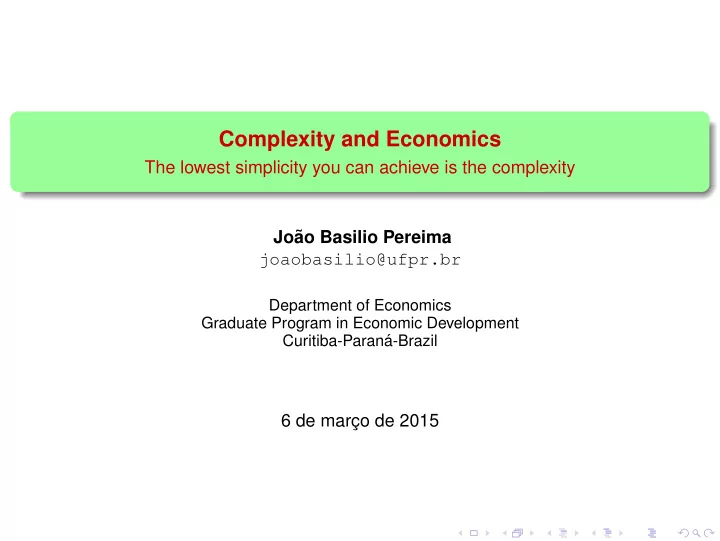
Complexity and Economics The lowest simplicity you can achieve is - PowerPoint PPT Presentation
Complexity and Economics The lowest simplicity you can achieve is the complexity Jo ao Basilio Pereima joaobasilio@ufpr.br Department of Economics Graduate Program in Economic Development Curitiba-Paran a-Brazil 6 de marc o de 2015
Complexity and Economics The lowest simplicity you can achieve is the complexity Jo˜ ao Basilio Pereima joaobasilio@ufpr.br Department of Economics Graduate Program in Economic Development Curitiba-Paran´ a-Brazil 6 de marc ¸o de 2015
Class01-Complexity Class02-Economics Referˆ encias Complexity and Economics CLASS 01 Complexity in General Science Complexity and Economics 6 de marc ¸o de 2015 2 / 25
Class01-Complexity Class02-Economics Referˆ encias Oppening Economics and Complexity is an introductory course for researchers and graduated students of economy who wish to comprehend the complex approach applied in economics and learn how to build agent based models. The curse aims to introduce ontological concepts and definitions, set out examples of what is a complex system and how these systems works and evolve in time. In a more pragmatic way the course aims to introduce two specific tools used to build up economic agent based models : the Laboratory of Simulation and Development (LSD) and Netlogo. Some economic and social models will be built by using computational resources intensively . Massive attention will be spent in theoretical questions in economics and programming methods and activities applied in developing agent-based models (ABM). Complexity and Economics 6 de marc ¸o de 2015 3 / 25
Class01-Complexity Class02-Economics Referˆ encias Complexity - Motivations (Science with a pinch of emotion) I think the next century will be the century of complexity. Stephen Hawking - January 2000 Complexity and Economics 6 de marc ¸o de 2015 4 / 25
Class01-Complexity Class02-Economics Referˆ encias Complexity - Motivations (Science with a pinch of emotion) Science has explored the microcosmos and the macrocosmos; we have a good sense of the lay of the land. The great unexplored frontier is complexity Heinz-Pagels: The Dreams of Reason Complexity and Economics 6 de marc ¸o de 2015 5 / 25
Class01-Complexity Class02-Economics Referˆ encias Complexity - Motivations (Science with a pinch of emotion) Science has explored the microcosmos and the macrocosmos; we have a good sense of the lay of the land. The great unexplored frontier is complexity Heinz-Pagels: The Dreams of Reason Economic science has explored the microeconomics and the macroeconomics; we have a (not so) good sense of the economic system. The great unexplored frontier is complexity Basilio, this economic course Complexity and Economics 6 de marc ¸o de 2015 5 / 25
Class01-Complexity Class02-Economics Referˆ encias Why economists do not understand Complexity well, if so? Our brains were designed to understand hunting and gathering, mating and child-rearing: a world of medium-sized objects moving in three dimensions at moderate speeds. Dawkins (1987) in The Blind Watchmaker Complexity and Economics 6 de marc ¸o de 2015 6 / 25
Class01-Complexity Class02-Economics Referˆ encias Frozen view? “Economic is not a evolutionary science - by the confession of its spokesman: and the economists turn their eyes with something of envy and some sense of baffled emulation to theses rivals that make broad their phylacteries [phylum] with the legend, ‘Up to date’. Precisely wherein the social and political sciences, including economics, fall short of being evolutionary sciences, is not so plain. ” Complexity and Economics 6 de marc ¸o de 2015 7 / 25
Class01-Complexity Class02-Economics Referˆ encias Frozen view? “Economic is not a evolutionary science - by the confession of its spokesman: and the economists turn their eyes with something of envy and some sense of baffled emulation to theses rivals that make broad their phylacteries [phylum] with the legend, ‘Up to date’. Precisely wherein the social and political sciences, including economics, fall short of being evolutionary sciences, is not so plain. ” Veblen (1899, p. 374-5) The same reasoning applies today to the Complexity Theory context. Ex.: Arthur (1994, 1999) Complexity and Economics 6 de marc ¸o de 2015 7 / 25
Class01-Complexity Class02-Economics Referˆ encias Reductionism and Complexity Reductionism is the most natural thing in the world to grasp. It’s simply the belief that “a whole can de understood completely if you understand its parts, and the nature of their ‘sum’ ”. No one in her left brain could reject reductionism. Hofstadter (1979, p. 318) The scientif method: “To dive all the difficulties under examination into as many parts as possible, and as many as were required to solve then” and “to conduct my thoughts in a give order, beggining with the simplest and most easily understood objects, and gradually ascending, as it were step by step, to the knowledge of the most complex ” Descartes (1637) Complexity and Economics 6 de marc ¸o de 2015 8 / 25
Class01-Complexity Class02-Economics Referˆ encias Why Complexity • Many phenomena in the physic, natural and social dimension of the reality can not be explained with concepts of mechanical physic • Large structures are assembled from particles or individuals in a way far beyond that the simple aggregation and sum • Structures evolves to an unpredictable future and forms • The time arrow is not reversible and many traditional scientific methods fails to explain and forecast • Commonly the systems shows up heterogeneity and produces novelty • The system (societies) are populated by ± heterogeneous agent who interacts with the others • We are far from comprehend the World or the Reality with the newtonian machine or statistical viewpoint, mainly in social and economic science • Statistical versus Deterministic versus Complexity view of the world Complexity and Economics 6 de marc ¸o de 2015 9 / 25
Class01-Complexity Class02-Economics Referˆ encias Why Complexity • Many phenomena in the physic, natural and social dimension of the reality can not be explained with concepts of mechanical physic • Large structures are assembled from particles or individuals in a way far beyond that the simple aggregation and sum • Structures evolves to an unpredictable future and forms • The time arrow is not reversible and many traditional scientific methods fails to explain and forecast • Commonly the systems shows up heterogeneity and produces novelty • The system (societies) are populated by ± heterogeneous agent who interacts with the others • We are far from comprehend the World or the Reality with the newtonian machine or statistical viewpoint, mainly in social and economic science • Statistical versus Deterministic versus Complexity view of the world Despite the progress of science in the XX century, many questions and answers remains open and can not be thought with traditional viewpoint Complexity and Economics 6 de marc ¸o de 2015 9 / 25
Class01-Complexity Class02-Economics Referˆ encias So, what is complexity? An interdisciplinary field of research that seeks to explain how large number of relatively simple entities organize themselves, without the benefit of any central controller into a collective whole that creates patterns, uses information, and, in some cases, evolves and learns. Mitchell (2009, p.4) Complexity and Economics 6 de marc ¸o de 2015 10 / 25
Class01-Complexity Class02-Economics Referˆ encias So, what is complexity? An interdisciplinary field of research that seeks to explain how large number of relatively simple entities organize themselves, without the benefit of any central controller into a collective whole that creates patterns, uses information, and, in some cases, evolves and learns. Mitchell (2009, p.4) Complex systems consist of units interacting in a hierarchy of levels, including subsystems composed of even more intricate sub-subsystems. Complex systems exhibit emergent properties due to the interaction of their subsystems when certain unspecific environmental conditions are met, and they show temporal and/or spatial patterns on a scale that is orders of magnitude bigger than the scale on which the subsystems interact. Fuchs (2013, p.4) A complex thing is something whose constituent parts are arranged in a way that is unlikely to have arisen by chance alone. Dawkins (1987, p.7) Complexity and Economics 6 de marc ¸o de 2015 10 / 25
Class01-Complexity Class02-Economics Referˆ encias So, what is complexity? A system of connected agents that exhibits an emergent global behavior not imposed by a central controller, but resulting from the interactions between agents. Boccara (2004, p.4) The science of complexity suggests that while life is in accordance with the laws of physics, physics cannot predict life. ´ Erdi (2008, p.5) Complexity results from the inter-relationship, inter-action and inter-connectivity of elements within a system and between a system and its environment. Murray Gell-Mann, in Complexity Vol. 1, No. 5, 1995/96, traces the meaning of complexity to the root of the word. Plexus means braided or entwined, from which is derived complexus meaning braided together, and the English word complex is derived from the Latin. Complexity is therefore associated with the intricate inter-twining or inter-connectivity of elements within a system and between a system and its environment. Chan (1997) Complexity and Economics 6 de marc ¸o de 2015 11 / 25
Class01-Complexity Class02-Economics Referˆ encias Ants, Neurons, Crowd and other complex system Complexity and Economics 6 de marc ¸o de 2015 12 / 25
Recommend
More recommend
Explore More Topics
Stay informed with curated content and fresh updates.
